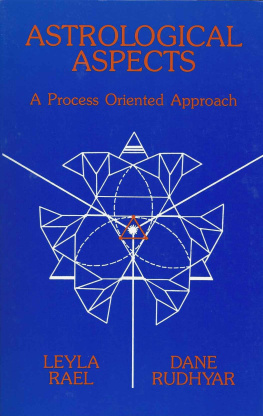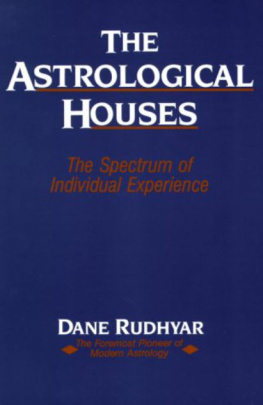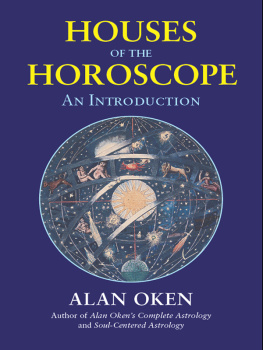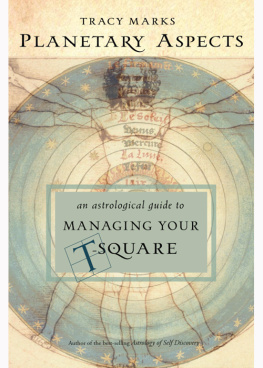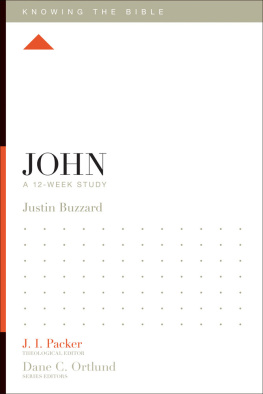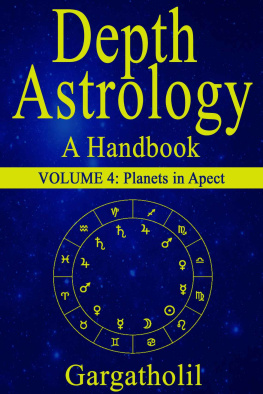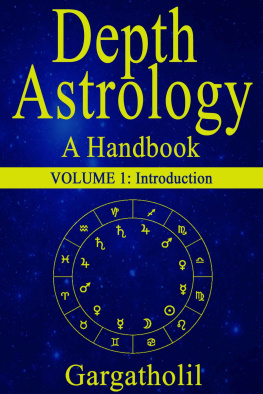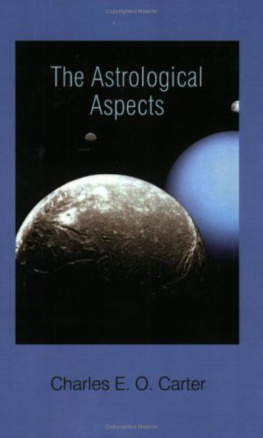Dane Rudhyar - An Astrological Study of Psychological Complexes
Here you can read online Dane Rudhyar - An Astrological Study of Psychological Complexes full text of the book (entire story) in english for free. Download pdf and epub, get meaning, cover and reviews about this ebook. year: 2015, publisher: Seth Morris, genre: Religion. Description of the work, (preface) as well as reviews are available. Best literature library LitArk.com created for fans of good reading and offers a wide selection of genres:
Romance novel
Science fiction
Adventure
Detective
Science
History
Home and family
Prose
Art
Politics
Computer
Non-fiction
Religion
Business
Children
Humor
Choose a favorite category and find really read worthwhile books. Enjoy immersion in the world of imagination, feel the emotions of the characters or learn something new for yourself, make an fascinating discovery.
- Book:An Astrological Study of Psychological Complexes
- Author:
- Publisher:Seth Morris
- Genre:
- Year:2015
- Rating:5 / 5
- Favourites:Add to favourites
- Your mark:
- 100
- 1
- 2
- 3
- 4
- 5
An Astrological Study of Psychological Complexes: summary, description and annotation
We offer to read an annotation, description, summary or preface (depends on what the author of the book "An Astrological Study of Psychological Complexes" wrote himself). If you haven't found the necessary information about the book — write in the comments, we will try to find it.
Dane Ruhdyar explores the psychological aspects of astrological planets and configurations in this classic.
Dane Rudhyar: author's other books
Who wrote An Astrological Study of Psychological Complexes? Find out the surname, the name of the author of the book and a list of all author's works by series.
An Astrological Study of Psychological Complexes — read online for free the complete book (whole text) full work
Below is the text of the book, divided by pages. System saving the place of the last page read, allows you to conveniently read the book "An Astrological Study of Psychological Complexes" online for free, without having to search again every time where you left off. Put a bookmark, and you can go to the page where you finished reading at any time.
Font size:
Interval:
Bookmark:
Dane Rudhyar
http://astro-chologist.com
The Complex and Its Origin
As so much in modern psychology, even at the popular level, turns around the use of the term complex and of what it stands for it is important for the astro-psychologist to gain a basic understanding of the subject. To know intellectually what this or that complex means in terms of the psychological ideas of Freud, Adler or Jung is not enough. The astrologer should have a clear grasp of the process according to which complexes form and develop, of their original causes in mans negative approach to life and experience, and of their correlation with the four fundamental drives in human nature drives which have definite and adequate representations in astrological symbolism.
The astrologer should also understand clearly how far he may be able to detect complexes through the study of a persons natal chart and progressions, and in what way he can use this astrological knowledge to help his clients, instead of (unwillingly) adding to their fears and their negative approach to life. In other words, he should be fully aware of the possibilities and of the limitations of astrological techniques when dealing with psychological complexes and all that relates to their development and cure or transformation.
The first task, in meeting the needs of the modern astrologer who seeks above all to be a psychologist and a helper of human beings, is to define the nature of the complex, as a general factor in psychology, and its origin.
The Columbia Encyclopedia defines the term complex as indicating a group or system of ideas which originates in the mind of an individual as the result of an experience or set of experiences of high emotional content, and which is repressed from the conscious mind, but continues nevertheless to show its presence through the subsequent mental activity and behavior of that individual The more or less complete dominance of a group of ideas making up a complex over the mental activity of an individual gives to a complex its abnormal or pathological significance.
Carl Jung, to whom modern psychology is mostly indebted for the concept of complex, defines complexes as psychological parts split off from the personality, groups of psychic contents isolated from consciousness, functioning arbitrarily and autonomously, leading thus a life of their own in the dark sphere of the unconscious, whence they can at every moment hinder or further conscious acts (cf. The Psychology of Jung by Jolan Jacobi, 1943, p. 35, etc.) Everyone has complexes. Complexes do not necessarily imply inferiority for the individual who has them they merely indicate that something un-united, unassimilable, conflicting exists; perhaps a hindrance, perhaps too a stimulus to greater efforts and so even to fresh successes. Yet they point out too the unquestionably weak place (emphasis mine) in every meaning of the word. The origin of the complex is to be found frequently in an emotional shock or the like. It probably has its ultimate basis, as a rule, in the apparent impossibility of accepting the whole of ones own individual nature.
I shall deal later on with some of these statements, but at this time the main facts to remember are that the complex is a group of set and unyielding psychic contents (ideas, feelings, sensations, memories, etc.) which have acquired a kind of solid rigidity and which are constantly adding to themselves similar mental-emotional elements according to a snowball process. Any complex begins with a particular experience, and grows in strength and inertia as similar experiences occur which the person identifies (rationally or not) with the first. More accurately, a complex originates in a persons reaction (either as an individual, or as a member of a group) to a particular experience; and any reaction to any experience can basically be classified as positive or negative even though obviously the distinction is not absolute, and most personal reactions include both positive and negative factors. Yet one of these two categories of factors can normally be seen to dominate and thus to give a characteristic feeling-tone to the individuals response. In time, an attitude to life or at least to a certain type of event is built in which either positiveness or negativeness clearly predominates.
It is often said that an individual is equal to the occasion. This means that as a new and as yet unexperienced event confronts the man, the latter has enough strength to meet its challenge. The momentum of the event and the resilient strength or power of adaptation of the individual are dynamically equal.
In order to grasp the full meaning of this, we have to realize that many natural events tend to disrupt the individual structure of any physical organism or personality. Life and individual consciousness or intelligence are precariously balanced within a field where intense forces of nature operate, ebbing and flowing according to the rhythm of vast cosmic tides that no man can control directly. Living organisms on earth can be killed by relatively very small changes of temperature; the bodys heat needs only be altered some five degrees to cause death. Likewise, the functions of the individual psyche are so delicately balanced, and the development of an intelligent, harmonious, sane, vibrant and individually creative personality is such a new factor in evolution on earth, that any violent and unexpected event a shock or trauma can quite easily disorganize and injure the individual organism of personality. The more individualized and conscious this bio-psychic organism, and the greater the sensitivity of the individual, the more disturbing or destructive tend to be the shocks which he encounters in a world that seems essentially alien, if not inimical.
Man can resist successfully violent shocks, either if he is very tough and insensitive, or if he has great creative (i. e. rebounding) power. Toughness, in most cases, is only of the surface; and if the blow is sharp and straightly aimed, the near-animal organism, once its hide is pierced, collapses at once. On the other hand, the sensitive but creative person, while his or her power of recovery may be great, has nevertheless to fight against an ever-increasing inner fatigue. He is not killed; but he may become weary to death of forever creating himself anew.
An experience of high emotional content is caused by an event with great dynamic power; that is, an event which hits a vital point in our bio-psychic organism an important nerve-center of our personal life, from which the blow radiates in many directions affecting a great part of our psyche and our ego-structure. Psychologically speaking, anything in our inner life to which the ego has given a very great value (thus around which he has organized his patterns of response, of enjoyment, and his symbols of meaning) becomes such a vital center. If the event destroys the object that represented this value in the world of experience (whether through death or disillusionment), a shock is the result.
Under this shock the sensitive and highly differentiated person will either tend to collapse, or with tense fervor set himself to the task of creating a new value. The less sensitive person may absorb the shock with far less injury, but his rough psychic skin may become callous from sheer self-protection. Under repeated similar shocks the callus may degenerate into a hard tumor which in due time may become malignant. In other words, the strong shock aimed at a vital center of value in the psyche may have one of three types of result (and often something of all three!): a disintegrative process sets in which, if it does not destroy, at least tends to corrode the creative springs of the inner life some kind of rigidity and crystallization develops which eventually may turn highly toxic or the individual, setting into operation the inner powers of his being, buries the dead and creates new values.
Font size:
Interval:
Bookmark:
Similar books «An Astrological Study of Psychological Complexes»
Look at similar books to An Astrological Study of Psychological Complexes. We have selected literature similar in name and meaning in the hope of providing readers with more options to find new, interesting, not yet read works.
Discussion, reviews of the book An Astrological Study of Psychological Complexes and just readers' own opinions. Leave your comments, write what you think about the work, its meaning or the main characters. Specify what exactly you liked and what you didn't like, and why you think so.


